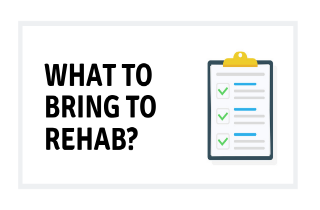Preparing for drug abuse rehabilitation
Making a decision to go to rehab can be one of the best choices you will ever make. Finding the most suitable type of treatment for you is the first step. Sometimes, this requires traveling away from home which can seems little scary at first sight. Other times, a rehab closer to home might be better suited for you.
Regardless of where you travel, rehab is a “timeout” from the world and helps you focus on …. you. But what are some things that you MUST BRING? And what types of materials or things should you leave at home?
We review here. Plus, we’ll tell you a little more about the stages of treatment you can expect. Finally, we’ll answer your questions and comments about drug rehabilitation at the end. Feel free to leave us a question if anything remains unanswered!
Drug abuse rehabilitation checklist
When preparing for treatment, packing is probably the last thing you want to be bothered with. Here, we make the process easier, providing a list of items you need to consider before going travelling to a rehabilitation facility:
- Bring enough prescription medication to cover the length of stay in treatment.
- It’s best to take modest, comfortable clothes. We generally recommend that you pack 7 days worth of clothing. You will probably be in charge of your own washing, and coin operated machines will be provided at the facility.
- Pack 30 days worth of hygiene products.
- Due to the structure of the day (and for your protection), we recommend you bring only the jewellery you wear every day.
- You may want to bring a small amount of money for personal items and travel home.
- To help you focus on recovery, self-help, recovery, and spiritual-based books or reading material are appropriate while getting the treatment.
Any of these items will probably be kept secure until your departure or shipped to your home at your expense. All electrical items, such as hair dryers and curling irons, will be checked for safety before you will have access to them.
What NOT to bring to a drug abuse rehabilitation center
1. Sexy clothes. Do NOT bring revealing shorts, skirts, halter tops, tank tops, mini skirts or muscle shirts. Focus on addiction recovery, and not on transference of dependence from substance(s) to sex/relationships.
2. Questionable products. Leave hygiene items that contain alcohol, metal, or medications at home. Otherwise, they may be taken during your stay.
3. Electronics. While internet may be available, it is usually heavily monitored for everyone’s safety and to help keep the environment therapeutic. Your cell phone may/may not be used during the program. No cameras or video recording devices are allowed in rehabilitation facilities, either. Video games are usually not allowed.
4. Any valuable items. There is no need to bring anything expensive to rehab. If you do bring jewelry or items by mistake, check to see if you may check into the facility’s safe box.
What happens during drug abuse rehabilitation?
So, now that you’re a little more prepared for how to pack, what can you expect during a stay at rehab? Because of the individual aspects of addiction, each person will follow different path to recovery. However, most people in treatment will pass through similar stages. Modalities differ depending on the effective therapeutic strategies and your specific case. Still, here are the common stages of addiction treatment:
The first week of rehab
In early treatment, you might feel emotionally fragile. You may also find it really hard to give up your drug-of-choice, and even resist help. These reactions are normal…and expected. This period is crucial, so treatment centers test different ways of promoting abstinence, preventing relapse, and managing cravings. You’ll also work a lot in groups and create both cohesion and a safe therapeutic atmosphere with other people. This overall focus on your acceptance of the problem and solutions available to you can create a better environment for everyone.
Weeks 2+ of rehab
In the middle stage of rehabilitation, people face the challenges that block them from having fulfilled lives. Psychotherapy and behavioral therapy form the bulk of what you learn. You’ll learn how to react to problems and how to communicate better. You might be open at this stage to establishing new, healthy habits. The bottom line is that the real work of rehab is in understanding, accepting, and then changing your thinking patterns. This is the substance…and you’ll work on it in group, individual, and family/couples psychotherapy sessions.
Getting ready to leave rehab
Late stage treatment turns toward identifying the treatment gains to be maintained and risks that remain. During this stage, you’ll probably focus on the issues of living, resolving guilt, reducing shame, and adopting a more introspective, relational view of yourself. You’ll also create a relapse prevention plan, and contact continuing care facilities (outpatient addiction treatment clinics, sober housing, or support services) to help you during transition to the “outside” world.
More on drug rehab facilities
Do you still have questions on what to bring with you or what to expect from the process of addiction rehabilitation? Please leave your questions or comments in the section below. We’ll do our best to respond to you personally and promptly.









Related Posts